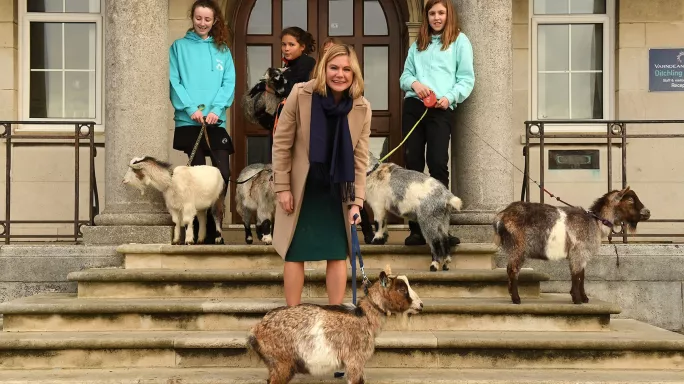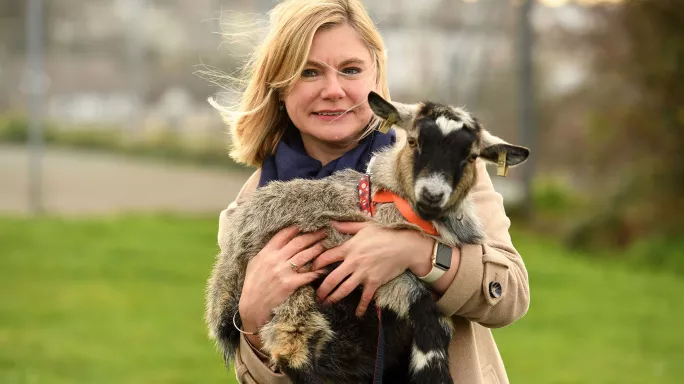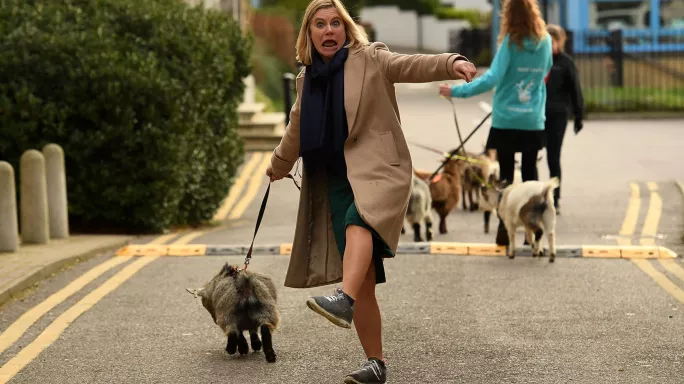- Home
- Justine Greening and the people’s goat - we’re not kidding
Justine Greening and the people’s goat - we’re not kidding

While people may be suspicious of politicians bearing gifts, goats are just happy to munch up each and every carrot going.
And so Justine Greening, on a visit to meet education’s most influential goats today at Varndean School in Brighton, had remembered to bring carrots.
The fact that a former education secretary, in the middle of the political crisis around Brexit, had decided to spend her Monday morning visiting the Varndean goats at all demonstrates the incredible pulling power of what must be England’s most high profile school pets.
They were first brought to the comprehensive as an alternative to a lawnmower, by Varndean’s director of finance and operations. Hilary Goldsmith had rehomed them from her former school to tidy some scrubby land. But they have become ever more valued for their pastoral care, with goat-petting time being used as a way to tackle poor behaviour among pupils and to help with emotional regulation.
And thanks to careful tuition from Ms Goldsmith on how to engage people on Twitter, the Varndean goats’ influence has spread way beyond the school gates. Last year, they were named as one of the Tes’ ten most influential people (and the only influential goats) in education.
So with Ms Goldsmith moving on after Christmas, to a new job as chief executive officer of a local animal welfare charity, Ms Greening’s visit seemed an appropriate testament to the power of the school goat.
The former cabinet minister may have 69,300 twitter followers, but the Varndean Goats are the only followers to have offered her a #goatdate if she popped down to Brighton to hang out.
Today Ms Greening was warned by members of the school’s goat club that their charges were no-deal goats when it came to food.
But the Putney MP was more than happy to swap her high heels for trainers to meet Alan, Ethel, William, Bertie, Angel, Pavilion and Downs - albeit as they stampeded towards her, falling over themselves and trampling on their fellows to snatch the vegetables from her hands.

“I’m keeping it real,” Ms Greening joked - shortly before coming face-to-face with Ziggy, a four-foot high alpaca wearing a festive candy-cane headdress.
Meanwhile back in Westminster, the vote on the crucial Brexit withdrawal deal loomed, with arguments and deals continuing to dominate all business. Ms Greening has already called for a second referendum to be held but while her aides kept a close eye on their phones, she made time to take the goats for a walk - after all, this visit had been months in the making.
“In politics, you have to be prepared,” Ms Greening said as she led William (the goat) out onto the school fields with its view south to the sea. “Things don’t always turn out as you expect and you have to make sure you are ready for all eventualities.”
But sometimes...things do work out.
“The goats are every bit as impressive as I’d hoped,” she said.

Of course, Ms Greening did not just visit the goats - she was quizzed over Brexit by Year 7 children in assembly. Ms Greening told them that she felt Brexit “whatever the merits” was a distraction from the big issues that Britain faces - things like education, jobs, health and housing. She met the school’s feminist society and talked to them about the work on gender pay gap reporting.
And she wanted to hear from Gareth Hughes, deputy head of the school, and Ms Goldsmith about their views on what needed fixing in education.
And there are problems, as any teacher or MP knows: school funding, teacher recruitment, an increasing strain on the local authority social services which support children and a fear that the curriculum is becoming more academic and less culturally-rich.
But the Varndean goats are an example of how, with a little imagination, staff can turn pupils’ school days into more than a round of PowerPoint presentations and bells.
Because while they are short, greedy and very real animals. Their presence in school, on Twitter and indeed in education is not really about goats.
Ms Goldsmith thinks that the goats’ secret has been their willingness to listen - they do not just tell people what they are up to in their corner of Brighton, but engage politely, humorously and with sass, even when tweeting politicians.
Mr Hughes said: “The goats have given us an opportunity for students to develop animal husbandry and provide a whole range of different ways to expand the curriculum.
“But it is not about goats, or even animals, it is about a mindset. It is the principle that the curriculum is not just about the classroom and exams, but at the end of the five years of secondary school, it is about the whole range of what students have learned.
“The goats don’t resonate with people because they are a gimmick, they resonate because they are part of our curriculum.”
And then after a morning with a herd of goats bleating, shoving and heading in many directions at once, it was time for Ms Greening to return to Westminster.

Ms Greening’s aides informed her that the PM was due to make a statement about Brexit in Parliament that afternoon - and Ms Greening removed her trainers, put on her high heels and left for London, with muddy hoof prints on her coat and a goat leader badge on her heart.
Keep reading for just £1 per month
You've reached your limit of free articles this month. Subscribe for £1 per month for three months and get:
- Unlimited access to all Tes magazine content
- Exclusive subscriber-only stories
- Award-winning email newsletters



